Essential Tips for One Time Background Checks
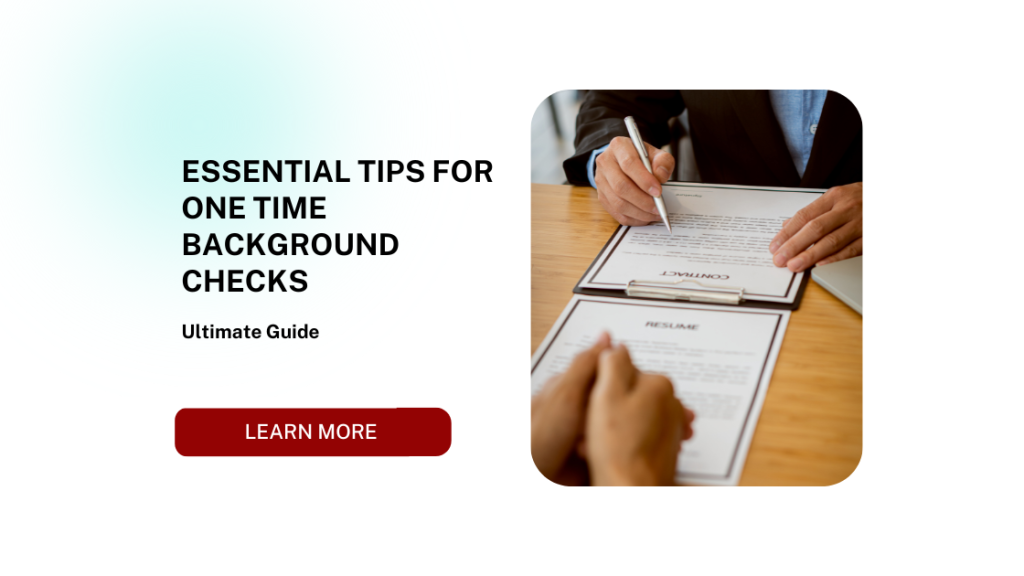
What Is a One Time Background Check? Everything You Need to Know
In today’s competitive job market, trust and transparency are critical in the hiring process. Employers want to ensure they are bringing the right people into their organizations, and job candidates want to secure positions that match their skills and background. One tool that bridges this trust gap is the one-time background check.
This article provides an in-depth understanding of what a one-time background check is, its purpose, and why it plays a vital role in hiring. Whether you’re an employer or a job seeker, understanding the process and its implications can help you navigate the hiring process confidently and effectively.
What Is a One Time Background Check?
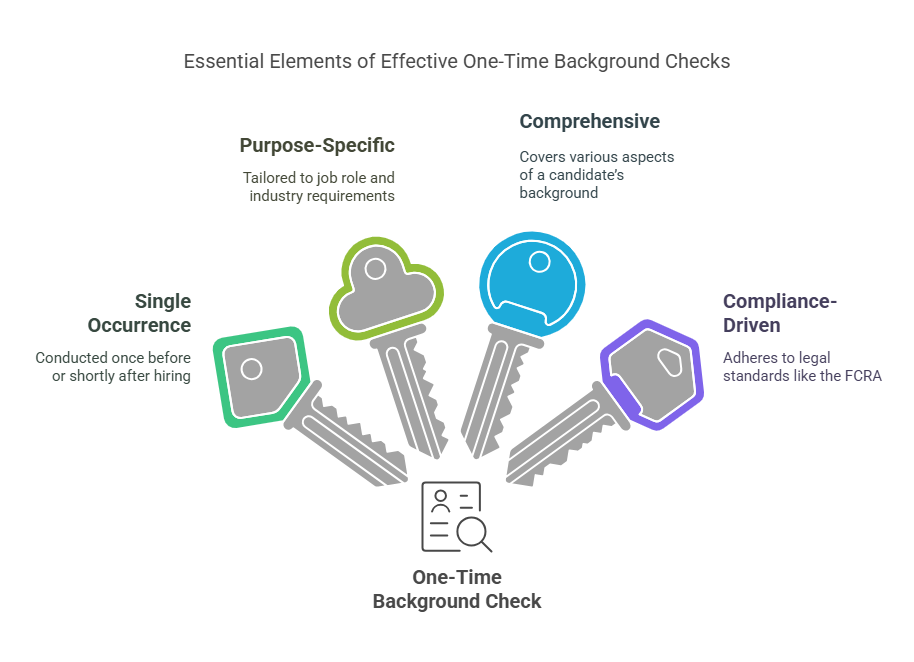
A one-time background check is a single, comprehensive screening process performed to verify a candidate’s personal, professional, and sometimes financial history. It is conducted at a specific point in the hiring process, often before a formal offer is made or during the onboarding phase.
Unlike ongoing background checks, which are repeated periodically throughout an individual’s employment, a one-time background check focuses solely on pre-employment verification. It serves as a snapshot of the candidate’s qualifications and history, helping employers make an informed hiring decision.
Key Characteristics of a One Time Background Check
- Single occurrence: Conducted once before or shortly after hiring.
- Purpose-specific: Tailored to the job role and industry requirements.
- Comprehensive: Covers various aspects of a candidate’s background, including criminal records, employment history, education, and sometimes credit history.
- Compliance-driven: Adheres to legal standards like the Fair Credit Reporting Act (FCRA).
Why Employers Use One Time Background Checks
Employers rely on one-time background checks to:
- Verify candidate information: Ensure resumes and applications accurately reflect a candidate’s qualifications.
- Mitigate risks: Identify potential red flags, such as criminal history or discrepancies in credentials, that could pose risks to the organization.
- Ensure workplace safety: Protect current employees and clients by verifying the integrity and reliability of new hires.
- Maintain compliance: Meet industry regulations and legal obligations, particularly in sectors like healthcare and finance.
For example, in financial institutions, verifying a candidate’s credit history may be critical for positions that involve managing money or sensitive client information.
What Information Does a One Time Background Check Include?
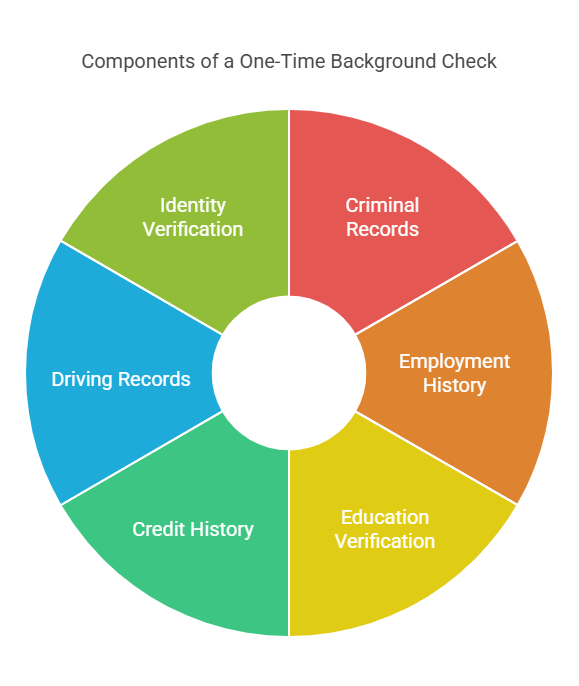
The scope of a one-time background check varies based on the employer’s needs and the specific job role. Here are the most common components:
1. Criminal Records
Employers often screen for criminal history to ensure candidates do not pose a security or safety risk. This may include checks for:
- Felonies or misdemeanors.
- Pending criminal charges.
- Warrants and arrests.
2. Employment History
Verifying a candidate’s prior work experience ensures that the information listed on their resume is accurate. Employers may contact past employers to confirm:
- Job titles.
- Dates of employment.
- Responsibilities and achievements.
3. Education Verification
This step confirms the authenticity of a candidate’s educational credentials, including:
- Degrees earned.
- Certifications.
- Training programs completed.
4. Credit History
For roles involving financial responsibilities, employers may review credit reports to assess financial stability. This includes:
- Debt levels.
- Payment history.
- Bankruptcies or liens.
5. Driving Records
For positions requiring driving, such as delivery or transportation roles, employers check driving records for:
- Valid licenses.
- Traffic violations.
- Accident history.
6. Identity Verification
To ensure legal eligibility for employment, background checks may include:
- Social Security number validation.
- Cross-referencing identification documents.
Who Typically Uses One Time Background Checks?
Industries That Rely on Background Checks
Some industries are more likely to conduct one-time background checks due to the nature of their work:
- Finance and Banking: To ensure the integrity of employees handling financial assets.
- Healthcare: To safeguard patient safety and comply with strict regulatory standards.
- Education: Schools and universities screen staff to protect students and maintain a reputable environment.
- Government: For positions requiring security clearances or access to confidential information.
- IT and Cybersecurity: To verify the reliability of individuals with access to sensitive systems and data.
Small Businesses
Small and medium-sized businesses often use one-time background checks to reduce hiring risks while managing limited resources.
Gig Economy Employers
Companies hiring independent contractors, such as delivery drivers or rideshare operators, use one-time checks to ensure a safe experience for customers.
Why One Time Background Checks Matter
- Building Trust
For employers, a one-time background check establishes trust that the candidate is qualified, honest, and reliable. - Minimizing Turnover
Hiring the right person the first time reduces costly turnover. A thorough screening process ensures candidates are a good fit. - Protecting Reputation
Employees represent their employers. Verifying a candidate’s background protects an organization’s brand and reputation. - Ensuring Compliance
Many industries have legal or regulatory requirements for background checks. A one-time check helps employers meet these obligations without engaging in ongoing monitoring.
How a One Time Background Check Works and How Precise Hire Makes It Easier
Introduction
A one-time background check is a structured process designed to verify critical information about job candidates. By conducting this screening, employers can make well-informed decisions, reduce risks, and ensure compliance with industry standards and legal requirements. In this section, we’ll dive into the step-by-step process of a one-time background check, highlight its benefits, and address common challenges. We’ll also explore how services like Precise Hire can simplify and enhance the process.
How Does a One Time Background Check Work?
The process of a one-time background check typically involves several key steps, both for employers and job candidates. Understanding this workflow can help ensure that the process is smooth and compliant with regulations like the Fair Credit Reporting Act (FCRA).
Step 1: Employer Authorization and Policy Setup
Before initiating any background check, employers must establish a clear policy outlining:
- The types of background checks to be conducted.
- The specific roles for which these checks are required.
- Compliance with applicable laws and regulations, such as obtaining candidate consent.
Step 2: Candidate Consent
Employers must obtain explicit written consent from the candidate before conducting a background check. This is a legal requirement under the FCRA and ensures transparency in the hiring process.
Step 3: Data Collection
Once consent is obtained, employers or background check providers like Precise Hire begin collecting the necessary information. This often includes:
- Full name and aliases.
- Date of birth.
- Social Security number.
- Addresses (current and past).
Step 4: Verifications
The collected data is then used to verify the following:
- Identity: Ensuring the candidate’s personal details match official records.
- Employment History: Contacting previous employers to confirm job titles, dates of employment, and responsibilities.
- Education: Verifying degrees, certifications, and credentials.
- Criminal Records: Checking local, state, and federal databases for any criminal activity.
Step 5: Review of Additional Reports (if applicable)
Depending on the job, additional checks may include:
- Credit reports (for financial roles).
- Driving records (for transportation roles).
- Professional licenses (for healthcare or engineering positions).
Step 6: Report Generation
Once all data is verified, a report is generated and shared with the employer. This report includes:
- A summary of findings.
- Any discrepancies or red flags.
- Recommendations for follow-up actions.
Step 7: Employer Review and Decision
Employers review the background check report to make an informed hiring decision. If discrepancies arise, candidates are typically given an opportunity to explain or dispute the findings before any action is taken.
What Happens After the One Time Background Check?
The outcomes of a one-time background check can vary, depending on the findings. Here are the possible scenarios:
- Clear Report: The candidate’s background aligns with the employer’s requirements, and the hiring process moves forward.
- Discrepancies Identified: Minor issues may be addressed through follow-up discussions with the candidate.
- Red Flags Detected: Serious concerns, such as falsified credentials or a criminal record relevant to the role, may lead to the rescission of a job offer.
Employers must ensure they communicate transparently with candidates throughout this process to maintain fairness and comply with legal obligations.
Benefits of Using a One Time Background Check
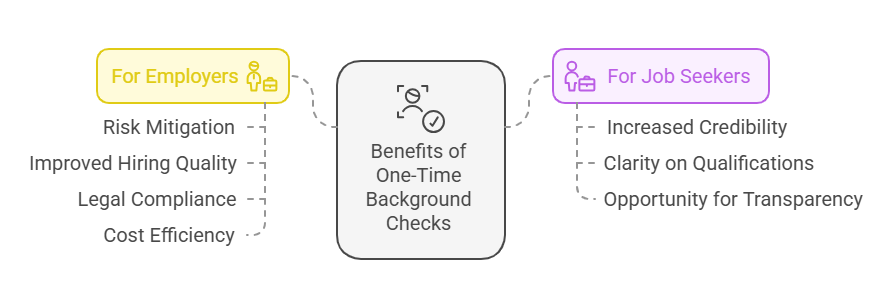
For Employers
- Risk Mitigation: Identifies potential issues before they impact the organization.
- Improved Hiring Quality: Ensures candidates are qualified and trustworthy.
- Legal Compliance: Helps employers adhere to federal and state regulations.
- Cost Efficiency: Conducting a one-time check eliminates the need for ongoing monitoring.
For Job Seekers
- Increased Credibility: A clear background check enhances trust with potential employers.
- Clarity on Qualifications: Verifications confirm the accuracy of the candidate’s credentials.
- Opportunity for Transparency: Candidates can address potential concerns proactively.
Challenges of One Time Background Checks
Despite their advantages, one-time background checks can present certain challenges:
1. Delays in Processing
Background checks may take longer if records are not readily accessible or if additional verification is required. Employers should plan for potential delays to avoid disruptions in hiring timelines.
2. Inaccurate Information
Occasionally, errors in background reports can occur, such as outdated or incorrect criminal records. Employers must work with reliable providers to minimize such inaccuracies.
3. Legal Complications
Employers who fail to follow FCRA guidelines risk legal consequences. For example, conducting a background check without proper candidate consent is a common compliance pitfall.
4. Candidate Discomfort
Some candidates may feel uneasy about the level of scrutiny involved in background checks. Transparent communication is essential to address these concerns and foster trust.
How Precise Hire Can Help Employers
Streamlining the Background Check Process
Precise Hire offers a comprehensive solution to simplify and optimize the one-time background check process. Here’s how:
- Accurate Reports: By leveraging advanced technology and extensive databases, Precise Hire ensures that reports are accurate and up to date.
- Fast Turnaround Times: Employers receive results promptly, helping to avoid hiring delays.
- Customizable Screening Packages: Tailored services allow employers to choose specific checks based on the job role.
- Compliance Expertise: Precise Hire ensures that all background checks adhere to FCRA and other legal standards.
- Candidate-Friendly Processes: Transparent communication and user-friendly systems make the process seamless for both employers and job seekers.
Supporting Legal and Ethical Practices
With Precise Hire, employers gain access to tools and guidance that ensure background checks are conducted ethically, legally, and with minimal risk of bias. This promotes fair hiring practices and enhances organizational integrity.
Legal Aspects of One Time Background Checks
Understanding the Fair Credit Reporting Act (FCRA)
The FCRA is a federal law in the United States that regulates how consumer information, including credit reports and background checks, can be used by employers. Key provisions include:
- Consent Requirements: Employers must obtain written permission from a candidate before conducting a background check.
- Disclosure Obligations: Employers must provide candidates with a clear, standalone disclosure explaining that a background check will be conducted.
- Adverse Action Notifications: If a negative background check impacts a hiring decision, employers must:
- Provide a copy of the report to the candidate.
- Notify the candidate of their rights under the FCRA.
- Allow the candidate time to dispute any inaccuracies.
Equal Employment Opportunity (EEO) Guidelines
Employers must ensure that background checks are applied consistently to all candidates, regardless of race, gender, age, or other protected characteristics. Discriminatory practices, such as disproportionately disqualifying candidates from certain demographics based on background check results, can lead to legal consequences.
State-Specific Laws
Some states impose additional restrictions on how background checks can be used in hiring. Examples include:
- Ban-the-Box Laws: Prohibit employers from inquiring about criminal history on initial job applications.
- Credit Check Restrictions: Limit the use of credit reports in hiring decisions, except for specific roles (e.g., financial or managerial positions).
Employers must familiarize themselves with the laws in their state to ensure compliance.
When is It Illegal to Conduct a One Time Background Check?
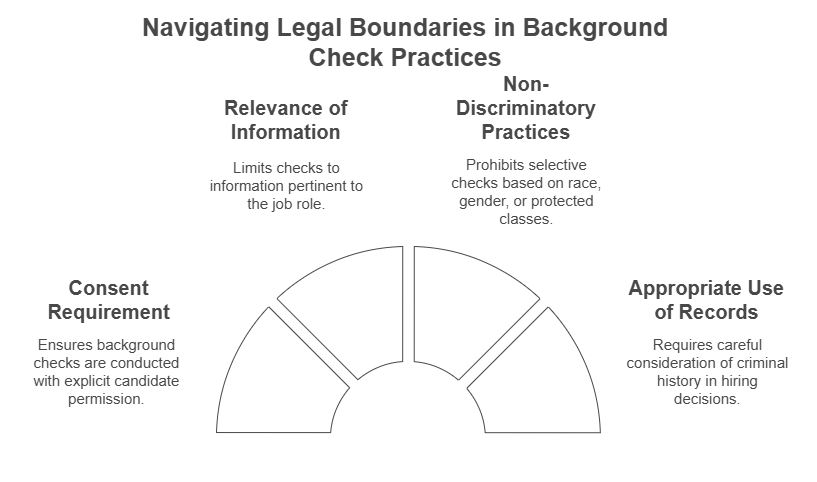
While one-time background checks are legal in most cases, certain scenarios may violate legal guidelines:
- Lack of Consent: Conducting a background check without the candidate’s explicit permission is a breach of the FCRA.
- Non-Relevant Checks: Using background checks for roles where the information is not relevant (e.g., running a credit check for a non-financial role) can be considered invasive or discriminatory.
- Discriminatory Practices: Applying background checks selectively based on race, gender, or other protected classes is unlawful under EEO regulations.
- Improper Use of Criminal Records: Automatically disqualifying candidates based on criminal history without considering the nature of the offense, how long ago it occurred, and its relevance to the job may violate “ban-the-box” laws or similar regulations.
How Employers Should Handle Negative Results
Employers must follow fair and transparent practices when dealing with negative background check results. Here are some best practices:
- Review Context: Assess the relevance of the negative information to the job role. For example, a minor offense from years ago may not be pertinent to the position.
- Communicate Clearly: Inform the candidate about the findings and provide an opportunity to explain or dispute the results.
- Use a Consistent Policy: Apply the same standards to all candidates to ensure fairness and compliance with EEO guidelines.
- Seek Legal Advice: Consult legal experts to ensure compliance with federal and state laws when taking adverse action based on a background check.
FAQs About One Time Background Checks
What Information is Included in a One-Time Background Check?
A one-time background check typically includes:
- Criminal records (local, state, and federal).
- Employment history and verification.
- Educational qualifications.
- Professional licenses.
- Credit reports (for specific roles).
- Driving records (for roles involving transportation).
How Long Does a One-Time Background Check Take?
The timeline varies depending on the depth of the check and the accessibility of records. On average, a background check can take anywhere from 1-5 business days. Delays may occur if additional verifications are needed.
Can a One-Time Background Check Be Used for Ongoing Employment Verification?
No. A one-time background check is conducted at a specific moment in time, typically during the hiring process. Ongoing verification may require periodic checks or continuous monitoring programs, depending on the employer’s policies.
What Should I Do If My Job Offer is Rescinded After a Background Check?
If your job offer is rescinded, you should:
- Request a copy of the background check report.
- Review the report for inaccuracies or errors.
- Dispute incorrect information with the background check provider or employer.
- Seek legal advice if you believe the decision was unfair or discriminatory.
How Can Employers Ensure That Their Background Checks Comply with the Law?
Employers can ensure compliance by:
- Following FCRA guidelines.
- Providing clear disclosures and obtaining consent.
- Using reputable background check providers like Precise Hire.
- Staying informed about state-specific laws and regulations.
What Information is Included in a One-Time Background Check?
A one-time background check typically includes:
- Criminal records (local, state, and federal).
- Employment history and verification.
- Educational qualifications.
- Professional licenses.
- Credit reports (for specific roles).
- Driving records (for roles involving transportation).
How Long Does a One-Time Background Check Take?
The timeline varies depending on the depth of the check and the accessibility of records. On average, a background check can take anywhere from 1-5 business days. Delays may occur if additional verifications are needed.
Can a One-Time Background Check Be Used for Ongoing Employment Verification?
No. A one-time background check is conducted at a specific moment in time, typically during the hiring process. Ongoing verification may require periodic checks or continuous monitoring programs, depending on the employer’s policies.
What Should I Do If My Job Offer is Rescinded After a Background Check?
If your job offer is rescinded, you should:
- Request a copy of the background check report.
- Review the report for inaccuracies or errors.
- Dispute incorrect information with the background check provider or employer.
- Seek legal advice if you believe the decision was unfair or discriminatory.
How Can Employers Ensure That Their Background Checks Comply with the Law?
Employers can ensure compliance by:
- Following FCRA guidelines.
- Providing clear disclosures and obtaining consent.
- Using reputable background check providers like Precise Hire.
- Staying informed about state-specific laws and regulations.
Key Takeaways
For Employers:
- Legal Compliance is Essential: Always adhere to FCRA requirements and state-specific laws.
- Use Trusted Providers: Partner with reliable background check services like Precise Hire to ensure accuracy and compliance.
- Be Transparent: Clearly communicate with candidates throughout the background check process.
- Focus on Relevance: Only request information that is pertinent to the job role.
For Job Seekers:
- Know Your Rights: Familiarize yourself with FCRA regulations and state laws.
- Check Your Records: Review your own background information for accuracy before applying for jobs.
- Be Honest: Disclose potential issues proactively and provide context during interviews.
- Challenge Inaccuracies: If discrepancies arise, take immediate steps to correct them.
Conclusion
A one-time background check is a critical tool in the hiring process, providing employers with valuable insights to make informed decisions. However, it must be conducted ethically, transparently, and in compliance with legal standards to protect both employers and candidates. Services like Precise Hire can streamline the process, ensuring accurate, timely, and legally compliant results.
Whether you’re an employer or a job seeker, understanding the nuances of one-time background checks can help you navigate the process with confidence and clarity. By prioritizing fairness and accuracy, these checks can create a safer, more reliable workplace for everyone.
